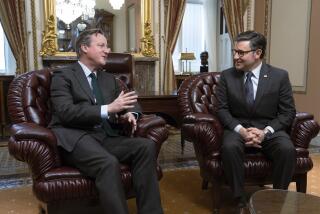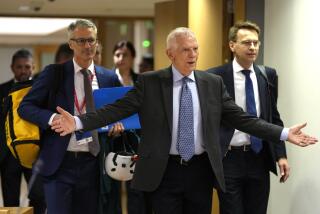Britain welcomes finding on Syrian use of chemical weapons
LONDON – Britain on Friday welcomed the U.S. statement that Syrian President Bashar Assad had deployed chemical weapons against the rebels battling his regime, a conclusion that prompted a pledge from President Obama to send arms to the opposition fighters for the first time.
The European Union took a more cautious approach, citing its “great concern” over the reports of chemical attacks and calling for United Nations inspectors to be allowed in to Syria to verify the allegations.
British Foreign Secretary William Hague said the mounting evidence of the use of chemical weapons such as the nerve agent sarin by Assad’s forces made an escalation of Western assistance necessary.
“We have to be prepared to do more to save lives, to pressure the Assad regime to negotiate seriously, to prevent the growth of extremism and terrorism and to stop the regime using chemical weapons against its people,” said Hague, who was in Washington this week before the Obama administration’s announcement Thursday.
Britain, Washington’s strongest ally, has been among the most outspoken advocates in Europe of stepping up assistance to those fighting Assad. In May, London and Paris pushed the European Union to drop its embargo on shipping arms to either side of the conflict, although EU leaders agreed that no weapons would be sent before Aug. 1.
British Prime Minister David Cameron said Friday that his government had not yet decided whether to help arm the rebels. But he brushed aside objections that the weapons could end up in the hands of Al Qaeda sympathizers or other Islamists.
“We can all sit here and say there are elements of the rebels who are extremists and extremely unsavory, and that is correct,” Cameron said on a call-in show on the BBC. “But my argument is that if we don’t engage with those of the Syrian opposition who do respect democracy, who do want an inclusive future for Syria … we may find a situation where it is only the extremists who have the access to help and support.”
Earlier, he said Washington’s announcement was consistent with Britain’s own conclusion that Assad had authorized “multiple attacks using chemical weapons in Syria.”
Catherine Ashton, the EU’s top diplomat, said the U.S. assessment was cause for alarm. But she stopped short of endorsing any moves to start dispatching weapons to the rebels, who have lost ground in Syria in recent days.
“These developments can only reinforce the importance of a political solution and should accelerate the efforts of the international community to find a definitive political solution to the conflict,” Ashton said in a statement.
ALSO:
High turnout reported as Iran picks new president
Protests against Sao Paulo bus fare hike turn violent
Turkey’s prime minister meets with antigovernment protesters
More to Read
Start your day right
Sign up for Essential California for news, features and recommendations from the L.A. Times and beyond in your inbox six days a week.
You may occasionally receive promotional content from the Los Angeles Times.







